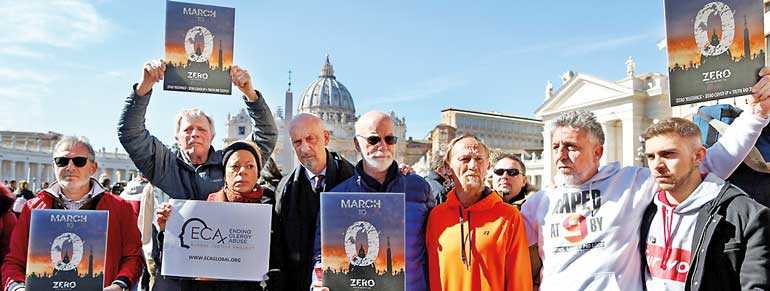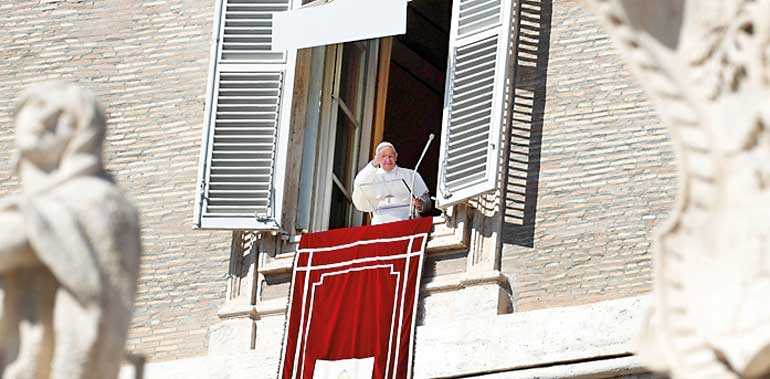Thursday Feb 26, 2026
Thursday Feb 26, 2026
Monday, 25 February 2019 00:00 - - {{hitsCtrl.values.hits}}

Peter Isley, survivor of sexual abuse, and founding member of the ECA (Ending Clergy Abuse) Denise Buchanan pose in front of Saint Peter’s Square, on the final day of the Vatican’s four-day meeting on the global sexual abuse crisis at the Vatican, 24 February – Reuters

Pope Francis leads the Angelus prayer in Saint Peter’s Square after the closing of a four-day meeting on the global sexual abuse crisis at the Vatican, 24 February – Reuters
VATICAN CITY, REUTERS: Pope Francis, ending a landmark conference on sexual abuse of children by clergy, called on Sunday for an “all-out battle” against a crime he said should be “erased from the face of the earth”.
The Pope promised that guidelines used by national bishops conferences to prevent abuse and punish perpetrators will be reviewed and strengthened. He also said the Church legal definition of minor will be raised from the current age of 14 in order to “expand protection” of young people.
But advocates for victims expressed deep disappointment, saying Francis merely repeated old promises and offered few new concrete proposals.
Francis vowed that the Roman Catholic Church would “spare no effort” to bring abusers to justice and will not cover up or underestimate abuse as he spoke at the end of a Mass in the frescoed Sala Regia of Vatican’s Apostolic Palace.
However, Francis dedicated much of the first part of a speech lasting more than half an hour to statistics from the United Nations and other organisations showing that most sexual abuse of children takes place in families.
“We are thus facing a universal problem, tragically present almost everywhere and affecting everyone. Yet we need to be clear, that while gravely affecting our societies as a whole, this evil is in no way less monstrous when it takes place within the Church,” he said.
Recycled rhetoric
Anne Barrett-Doyle of the US-based clergy abuse tracking group bishopaccountability.org, called it a “stunning let-down” that did not sufficiently address the grief and outrage of the faithful.
“As the world’s Catholics cry out for concrete change, the Pope instead provides tepid promises, all of which we’ve heard before,” she said in a statement. “Especially distressing was the Pope’s familiar rationalisation that abuse happens in all sectors of society. We needed him to offer a bold and decisive plan. He gave us instead defensive, recycled rhetoric,” she said.
Speaking later in his traditional public Sunday address in St. Peter’s Square, Francis said past cover-ups by some in the Church and the protecting of abusers was “unjustifiable”.
The Vatican says it will formulate follow-up measures to make sure all bishops from around the world return home knowing how to put anti-abuse procedures into place.
The conference brought together bishops from countries such as the United States, where cases of abuse have fallen dramatically because of measures enacted nearly 20 years ago, and bishops from far-flung countries, mostly poor countries who still have not come to terms with the problem.
At the start of the conference on Thursday, the Pope and the participants had watched a video of five victims telling their stories of abuse and cover-up.
‘Our own worst enemy’
The homily of the Mass that formally ended the gathering of some 200 top Church leaders was delivered by Archbishop Mark Coleridge of Brisbane, Australia, whose words were in many ways more pungent than the Pope’s.
“We will not go unpunished,” Coleridge said. “In abuse and its concealment, the powerful (of the Church) show themselves not men of heaven but men of earth,” he said.
“At times, however, we have seen victims and survivors as the enemy, but we have not loved them, we have not blessed them. In that sense, we have been our own worst enemy,” he said.
On Saturday, a nun and a woman journalist addressed the conference to deliver tough criticism of Church, accusing them of hypocrisy and covering up horrendous crimes against children.
During the conference, a list of 21 ‘reflection points’ was handed out. The first was that each diocese should have a ‘practical handbook’ on steps to be taken when cases emerge.
They included actions such as informing civil authorities of substantial accusations in compliance with local law and making sure non-clerics are involved in Church investigations of abuse.
The meeting took place after events in 2018 made it the most problematic year for the Pope since his election in 2013.
In Ireland, where the Pope visited in August, the sexual abuse scandal shattered the power of the Church which four decades ago dominated society.
In Chile, which he visited in January, all of the country’s bishops offered their resignations last year over a widespread cover-up. Francis accepted seven of the resignations and dismissed two others from the priesthood.
A report by a grand jury in Pennsylvania last year revealed that priests had sexually abused about 1,000 people over seven decades in that US state alone.